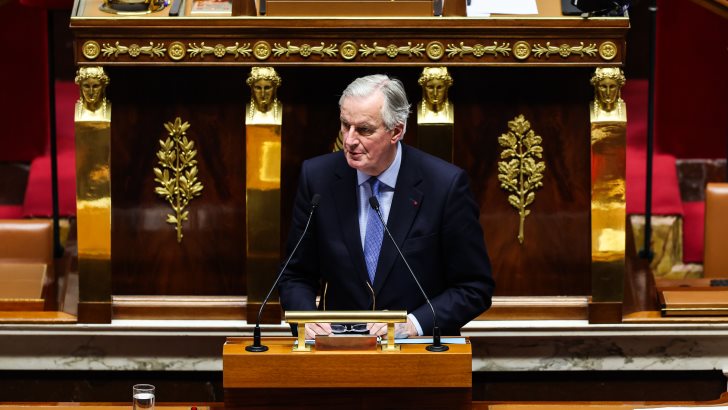
Michel Barnier's government has faced a major setback after losing a critical confidence vote, plunging France into a phase of political uncertainty. This development, although anticipated by many, has important consequences for France and Europe at large. While the immediate market reaction was relatively subdued—indicating that the political outcome had already been priced in—this event carries long-term implications for the euro, European markets, and French government bonds.
Political Instability and Market Reactions
Unlike the sharp volatility often seen in response to political shocks, the loss of the confidence vote in Barnier’s government did not trigger significant market upheaval. Both the CAC 40 and the Euro Stoxx 50 indices remained relatively stable, as investors had already factored in the likelihood of Barnier’s political defeat. Market participants had anticipated this outcome, and the absence of immediate large-scale selloffs suggested that investors believe the situation is still under control, at least in the short term.
However, the lack of market panic does not imply that the political situation in France is inconsequential. France’s economy, the second-largest in the Eurozone, is navigating post-pandemic recovery challenges, alongside broader European issues like inflation and energy security. The government’s collapse introduces uncertainty into policy-making, particularly in terms of fiscal discipline and public sector reforms.
Impact on Emmanuel Macron and France's Political Future
With Barnier’s government losing the confidence vote, attention now turns to President Emmanuel Macron, whose role in the next phase of this political saga is critical. Macron, who has already faced significant challenges over the past few years—from the Yellow Vests protests to pension reform disputes—now faces the task of either appointing a new government or navigating fresh elections.
Macron’s immediate next steps could include appointing a caretaker government to manage the country’s affairs temporarily. Alternatively, he could seek to negotiate alliances or form a coalition, although France’s fragmented political landscape makes this a difficult task. Failure to stabilize the political situation could deepen France’s institutional gridlock, hindering the country’s ability to address its economic challenges.
Macron’s political capital is also at stake. If he fails to stabilize the situation, it could embolden opposition parties, including populist or eurosceptic movements. This could have long-term implications for France’s role within the European Union, especially if political instability leads to more inward-looking or protectionist policies.
Impact on the Euro and European Markets
The euro has historically reacted to political uncertainty, especially when it affects a key member state like France. However, much like the reaction of the stock markets, the euro did not experience a sharp selloff following Barnier’s government’s fall. The muted response suggests that markets had already accounted for the potential instability in France.
Nonetheless, prolonged political uncertainty could weigh on the euro over time. If the political gridlock continues or if a new government fails to present a coherent economic plan, investors may lose confidence in France’s economic trajectory, which could eventually lead to downward pressure on the euro. This would add to the European Central Bank's (ECB) already delicate balancing act of managing inflation while supporting growth across the Eurozone.
French Government Bonds: Yields and Rising Public Debt
One of the most pressing concerns for France, following this political fallout, is the trajectory of its public debt and government bond yields. Although bond markets did not react dramatically immediately after the vote, rising yields remain a concern for the French government. Investors could demand higher returns on French bonds as uncertainty persists, increasing France’s borrowing costs.
This is particularly problematic given France’s already elevated public debt levels, which have exceeded 110% of GDP. Rising bond yields increase the cost of servicing this debt, placing further strain on the public finances. If political instability leads to delays in economic reforms or further spending to manage social unrest, the debt situation could deteriorate further.
Higher yields on French government bonds would not only impact France but could also influence broader European markets. Other Eurozone countries, especially those with higher debt-to-GDP ratios like Italy or Spain, might see their borrowing costs rise in response to volatility in the French bond market. This could put additional pressure on the ECB to intervene in debt markets, a move that would complicate its current efforts to contain inflation.
Long-Term Implications for European Markets
Although the immediate market reactions were calm, the long-term implications of Barnier’s political defeat are more complex. France’s role as a key driver of the Eurozone economy means that its political and fiscal health is crucial to the overall stability of Europe. Should France fail to stabilize its government, the risk of prolonged economic stagnation or populist resurgence becomes more pronounced.
Political uncertainty in France could also undermine broader European policy coordination efforts, particularly on critical issues such as energy policy, inflation control, and fiscal stability. This could lead to increased volatility in European markets as investors reassess the risks posed by the region's second-largest economy.
Conclusion
While Michel Barnier’s government losing the confidence vote was largely priced in by the markets, the political instability it creates should not be underestimated. Emmanuel Macron’s next steps will be crucial in determining whether France can avoid a prolonged political and economic crisis. The implications for the euro, European markets, and French government bonds may evolve slowly, but they carry significant long-term risks.
The rise in French bond yields and the country’s already high public debt make this a particularly precarious time for France’s economy. Political paralysis could stall crucial reforms, leading to higher borrowing costs and fiscal instability. As the situation unfolds, Europe will be closely watching Macron’s maneuvers, as the stability of the Eurozone’s second-largest economy remains critical for the broader European project.




















